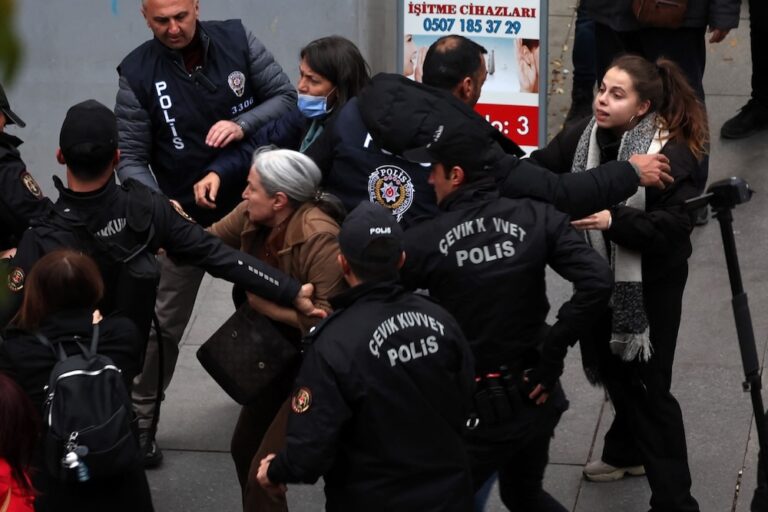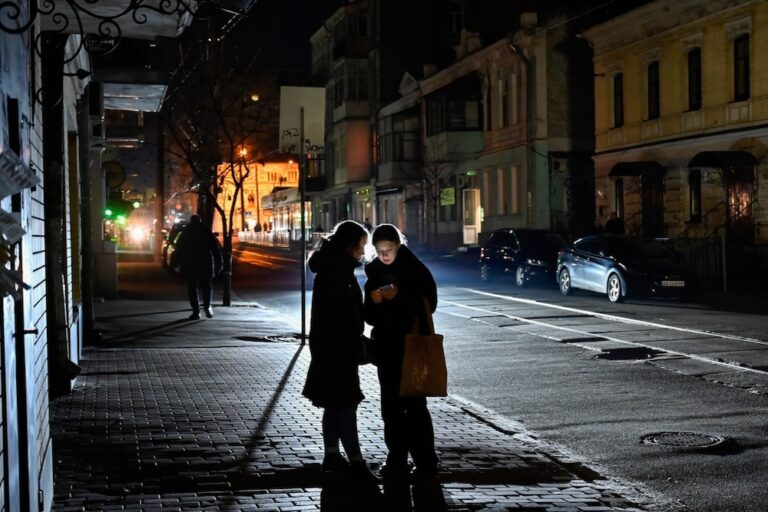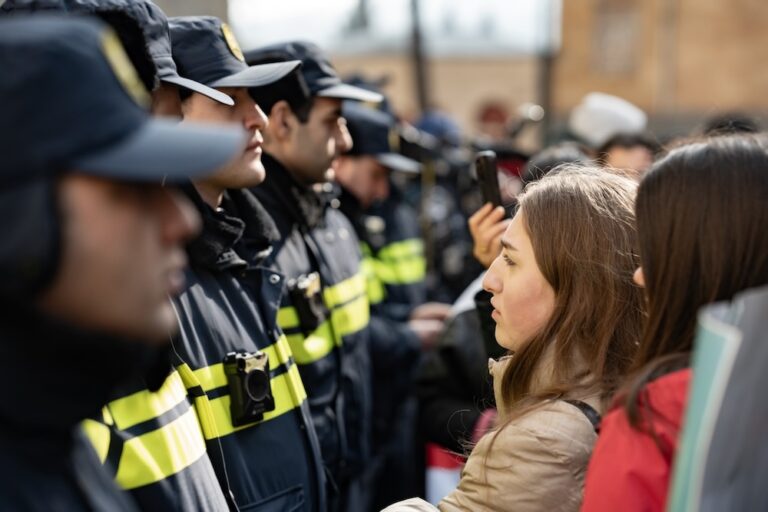January 2022 in Europe and Central Asia: A free expression round up produced by IFEX's Regional Editor Cathal Sheerin, based on IFEX member reports and news from the region.
Erdoğan and allies target prominent women in the arts and media; Kazakh authorities accused of using excessive force and torture during disturbances; US Justice Department charges four Belarusian officials with aircraft piracy; PACE condemns “extensive and virulent attacks” on LGBTQI+ rights; Wikileaks’s Julian Assange wins opportunity to appeal extradition decision.
“You can’t crush my tongue”
President Recep Tayyip Erdoğan’s “war with art and culture” (detailed by Arzu Geybullayeva in a recent article for the Global Voices website) continued in January. Recent years have seen several figures from Turkey’s arts and entertainment sectors threatened, harassed or otherwise persecuted for their work, and this month saw another big name added to the list: singer and songwriter Sezen Aksu.
After Islamist groups accused the singer of “attacking traditional values” in the lyrics of her song ‘It is a great thing to live’ (they objected to the line ‘Say hello to those ignorant Eve and Adam’), Aksu found herself targeted by Erdoğan, his supporters and government-aligned media. A pro-Erdoğan group filed a criminal complaint against her for “degrading religious values”; Turkey’s media regulator warned music channels against playing her song; and Erdoğan himself stated publicly that those who “defame” Adam should have their tongues “ripped” out. Aksu has responded defiantly by releasing a new song – ‘the Hunter’ – with includes the pointed lyrics: “You can’t crush my tongue”.
Aksu is one of four figures to whom over one thousand Turkish intellectuals pledged support in late January, in a public statement that criticised the government’s attack on rule of law and democratic principles.
January also saw developments in a number of other high-profile cases that are of particular interest to IFEX members: journalist Sedef Kabaş was arrested and charged with “insulting the president” after she quoted a proverb on TV (“A bull does not become king just by entering the palace, but the palace becomes a barn”); the European Court of Human Rights (ECtHR) ruled that Turkey violated Die Welt journalist Deniz Yücel’s rights when he was arrested in 2017 and detained for 367 days; an İstanbul court once again refused to abide by an ECtHR ruling to release detained civil society leader Osman Kavala; and journalist Rojhat Doğru was sentenced in absentia to life in prison on terrorism-related charges for his coverage of the protests in Kobanî, Syria, in 2014.
A number of reports looking back on Turkey’s human rights record during 2021 were published in January. All underlined the perilous situation for freedom of expression and other rights: the ECtHR’s Annual Report revealed that Turkey continued to be the leading violator of free expression in 2021, with the ECtHR ruling against the country in 31 free expression cases; Turkey also ranked third on a list of five countries that were responsible for 95% of all content removal requests made to Twitter in the first half of 2021 (Turkey made 5,454 such requests); Expression Interrupted’s summary of the final quarter of 2021 showed that 203 journalists appeared before courts in 98 cases during the period; and Bianet’s Male Violence Monitoring Report revealed that there were 324 femicides in 2021, the year in which Turkey withdrew from the Istanbul Convention on violence against women (this is 40 more than in 2020, when there were 284 femicides).
Excessive force
In Kazakhstan, early January saw approximately 12,000 arrests and 225 deaths (including those of 19 police officers), as the authorities cracked down on both the peaceful demonstrations and the riots that were then sweeping the country.
What started on 2 January in the city of Zhanaozen as a protest against rising gas prices, soon spread to other cities and towns as many thousands of citizens began agitating for economic and political reforms. On 4 January, a state of emergency was declared and the government resigned.
Police – who used stun grenades, tear gas and live ammunition – targeted protesters, journalists and rioters alike. President Kassym-Jomart Tokayev, who at various points blamed the unrest on “independent media”, “overseas individuals” and armed militants from the Middle East, gave the Kazakh security forces a “shoot-to-kill” order. Internet shutdowns were employed to disrupt the protests and prevent coverage by the press.
Several journalists were arrested; many were injured by both rioters and police; one media worker was shot dead and the offices of five local TV stations were set on fire. Regional IFEX member Adil Soz, the Committee to Protect Journalists (CPJ), Reporters Without Borders (RSF) and the International Press Institute have documented many of these assaults on the media. RSF has asked the UN and the OSCE (Organization for Security and Co-operation in Europe) to examine the targeting of the press by the Kazakh authorities.
The arrests and harassment of journalists continued in the aftermath. Opposition activists have also alleged that they were tortured in police custody during the disturbances.
In late January, Human Rights Watch published a report based on its analysis of 80 verified videos recorded during 4-6 January in the city of Almaty. The videos show that the Kazakh authorities used excessive force on at least four occasions. “The worst of the four incidents analysed in the videos led to 10 apparent killings, with 19 people injured,” the organisation said, adding: “The full toll is likely higher, both in this case and in others”.
Free Andrei Aliaksandrau and Irina Zlobina
In January, the US Justice Department charged four Belarusian government officials with conspiracy to commit aircraft piracy for their role in the 2021 forced landing in Belarus of a plane carrying NEXTA editor Raman Pratasevich. The charges followed the publication of a UN report which said that the Belarusian government’s claim that it had forced the plane down because of a bomb threat was “deliberately false”. Pratasevich, who faces a potential 15 years in prison in connection with the protests that followed the 2020 presidential election, was released from house arrest this month.
The authorities continue to persecute civil society organisations and journalists, including Aliaksandr Ivulin (jailed in January for two years for covering protests) and Sevyaryn Kvyatkouski (detained this month on his return to Belarus after spending six months abroad).
January also marked the one-year anniversary of the detention of journalist and rights defender Andrei Aliaksandrau and his partner Irina Zlobina. Index on Censorship and ARTICLE 19 launched a campaign calling for their release.
Exiled opposition leader Sviatlana Tsikhanouskaya called this month for the Day of Solidarity with Belarus (9 February) to be dedicated to the “free media, journalists, bloggers, and all those who tell the truth about the situation in the country”.
In brief
In the UK, the High Court ruled that Julian Assange could go to the Supreme Court to appeal an earlier court decision allowing his extradition to the US. If extradited and convicted, Assange faces 175 years in prison for publishing information in the public interest. He remains behind bars in the high-security Belmarsh Prison.
Nineteen press freedom organisations pledged their support to investigative journalist Carole Cadwalladr when she faced a libel trial in the UK in January. Cadwalladr is the target of a SLAPP (Strategic Lawsuit Against Public Participation) over comments she made during a TED Talk (and a tweet linking to the talk), in which she alleged that British businessman Arron Banks had lied about his relationship with the Russian government. The court’s written decision is expected in the coming weeks or months.
The Case Coalition launched a petition this month calling on the EU to pass binding legislation that protects all SLAPP victims. By the end of January, the petition had over 200,000 signatures.
Towards the end of January, the Parliamentary Assembly of the Council of Europe adopted a resolution condemning “the extensive and often virulent attacks” on LGBTQI+ people’s rights in member states. Pointing in particular at Hungary, Poland, the Russian Federation, Turkey and the UK, the Assembly noted that the main threat came from “political figures, including government representatives, as well as religious leaders”. The Assembly also called on member states not to enact anti-LGBTQI+ legislation and to implement ECtHR rulings where violations of the rights of LGBTQI+ people had been found.
Since January 2021, when the Constitutional Tribunal’s ban on almost all abortions in Poland came into force, over 1,000 Polish women have turned to the ECtHR in order to secure their reproductive rights. In this they have been assisted by international rights organisations, including IFEX member Human Rights Watch. The ban has already resulted in women’s deaths: in September 2021, a young woman died of septic shock because doctors would not terminate her no longer viable pregnancy; in January 2022, another woman died after doctors refused to carry out an abortion and left a dead foetus in her womb for a week.
IFEX joined a group of ten free expression organisations this month in raising concerns at the lack of transparent consultation with civil society following the Daphne Caruana Galizia public inquiry in Malta. The group reminded Prime Minister Abela that the implementation of the inquiry’s recommendations must meet international standards, and asked him to engage in meaningful and open consultation going forward, “in particular through publishing proposed legislation relating to media freedom”.



